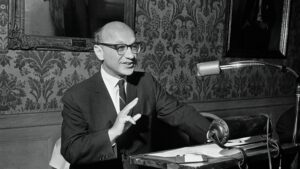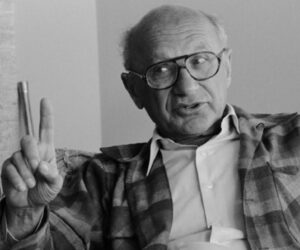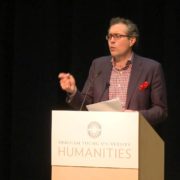What I find most appalling is not Friedman’s essay and its profoundly flawed reasoning but the mere suggestion by “The Conservative Promise” that we revert to an educational system that harmed untold numbers of our children because they and their families were too poor or too uninformed or too dependent on the wealthy for their livelihood to have an honest choice.
With so much chatter about Mandate for Leadership, The Conservative Promise (Project 2025), in the news, I made a PDF of it and read the areas that most interest me, such as the one on public education. On page 319 of that part’s introduction, I read, “Elementary and secondary education policy should follow the path outlined by Milton Friedman in 1955, wherein education is publicly funded but families make education decisions.”

Milton Friedman (photo courtesy New York Times)
In his essay, The Role of Government in Education, Friedman argues for a mixed system in “which governments would continue to administer some schools, but parents who chose to send their children to other schools would be paid a sum equal to the estimated cost of educating a child in a government school, provided that at least this sum was spent on education in an approved school.” In our words, a voucher.
After Friedman’s essay is completed, he is informed that his suggestion is being used as a tool in some southern states as a means to oppose the Supreme Court decision in Brown vs. Board. Friedman’s note #2 of his essay answers this criticism of his plan in a thoughtful explanation as he explains how he deplores prejudice and segregation, but he continues to think in terms of choice in a free market. He writes, “Yet, so long as the schools are publicly operated, the only choice is between forced nonsegregation [sic] and forced segregation; and if I must choose between these evils, I would choose the former as the lesser [evil].”
His solution continues to be the suggestion made in his essay: “The fact that I must make this choice is a reflection of the basic weakness of a publicly operated school system. Privately conducted schools can resolve the dilemma. They make unnecessary choices. Under such a system, there can be exclusively white schools, exclusively colored schools, and mixed schools. Parents can choose which to send their children to. The appropriate activity for those who oppose segregation and racial prejudice is to try to persuade others of their views. If and as they succeed, the mixed schools will grow at the expense of the nonmixed [sic], and a gradual transition will take place.”
I suggest that Friedman ignores the force of power in culture.
[perfectpullquote align=”full” bordertop=”false” cite=”” link=”” color=”” class=”” size=””]For instance, in Virginia County, where I live, a few families control the wealth and influence. They have much purchasing power and can afford to begin a school based on religion or some other philosophy. So, for the 2025 Project to write that if we follow Friedman’s plan of vouchers, families will have choices is wrong. Wealthier families will, and do now, have choices, but not most families.[/perfectpullquote]
For instance, let’s imagine that a religious group in my poor and rural county wants to have a school that reflects their beliefs. It is great for families with private transportation and time daily to transfer children to and from school. But what choice does the family have without an automobile and lives out of town because housing is cheaper? Sure, the religious family would want that type of religious-based education, but is that even a remote choice for it and others like it? Not likely.
[perfectpullquote align=”full” bordertop=”false” cite=”” link=”” color=”” class=”” size=””]Friedman and the Mandate for Leadership, The Conservative Promise adherence to his plan, will gut our public-school educational system by giving more power to those with too much power and influence. If we follow such a plan of vouchers, we will be removing more dollars and influence from our public schools. The resulting inequality, a chasm between more affluent schools in wealthier zip codes and poorer ones, would only worsen under such a plan.[/perfectpullquote]
In Virginia, then-Governor Byrd led a state-wide resistance to Brown vs. Board “Massive Resistance” shutting public schools. At the same time, all-white “academies” opened, supported by Whites who had the power to choose their children or any White child who wanted to attend received an education. Still, the non-White children lost years of their education because they were too poor to have a choice. Based on that history, I suggest that “family choice,” “school vouchers,” or other nice-sounding expressions have evolved into coded phrases.

Photo courtesy Institute for New Economic Thinking
The following quotation in note #2, written by Friedman after Brown vs. Board, shows why I see the Mandate for Leadership’s use of him as proof of its real intent:
“Under such a system, [Friedman’s] there can develop exclusively white [sic] schools, exclusively colored schools, and mixed schools. Parents can choose which to send their children to. The appropriate activity for those who oppose segregation and racial prejudice is to try to persuade others of their views; if and as they succeed, the mixed schools will grow at the expense of the nonmixed,[sic] and a gradual transition will take place. So long as the school system is publicly operated, only drastic change is possible; one must go from one extreme to another; it is a great virtue of the private arrangement that permits a gradual transition.”
No doubt our public educational system has problems that have not been adequately addressed; more money, more academic programs, more parental rights, and more involvement by non-educators, like vouchers, are simple answers for complex problems that generally worsen things. Now, with this Mandate for Leadership, the primary author of the section for education, Ms. Lindsay M. Burke, uses Friedman’s essay as the path we should follow in our public schools.
What I find most appalling is not just that Friedman’s essay is based on deeply flawed reasoning but also that The Conservative Promise contends that we revert to an educational system that harmed untold numbers of our children. They and their families were too poor, too uninformed, or too dependent on the wealthy for their livelihood to have an honest choice.
[perfectpullquote align=”full” bordertop=”false” cite=”” link=”” color=”” class=”” size=””]The “gradual transition” that Friedman writes about and Ms. Burke desires will only benefit the ones who have. At the same time, the have-nots will become even more downtrodden.[/perfectpullquote]
The shameful system that existed in 1955 when Friedman was composing his essay and ruled unconstitutional by the Supreme Court should not be resurrected under the guise of “rights” or “choice.”
__________
Cover photo courtesy FORBES.



